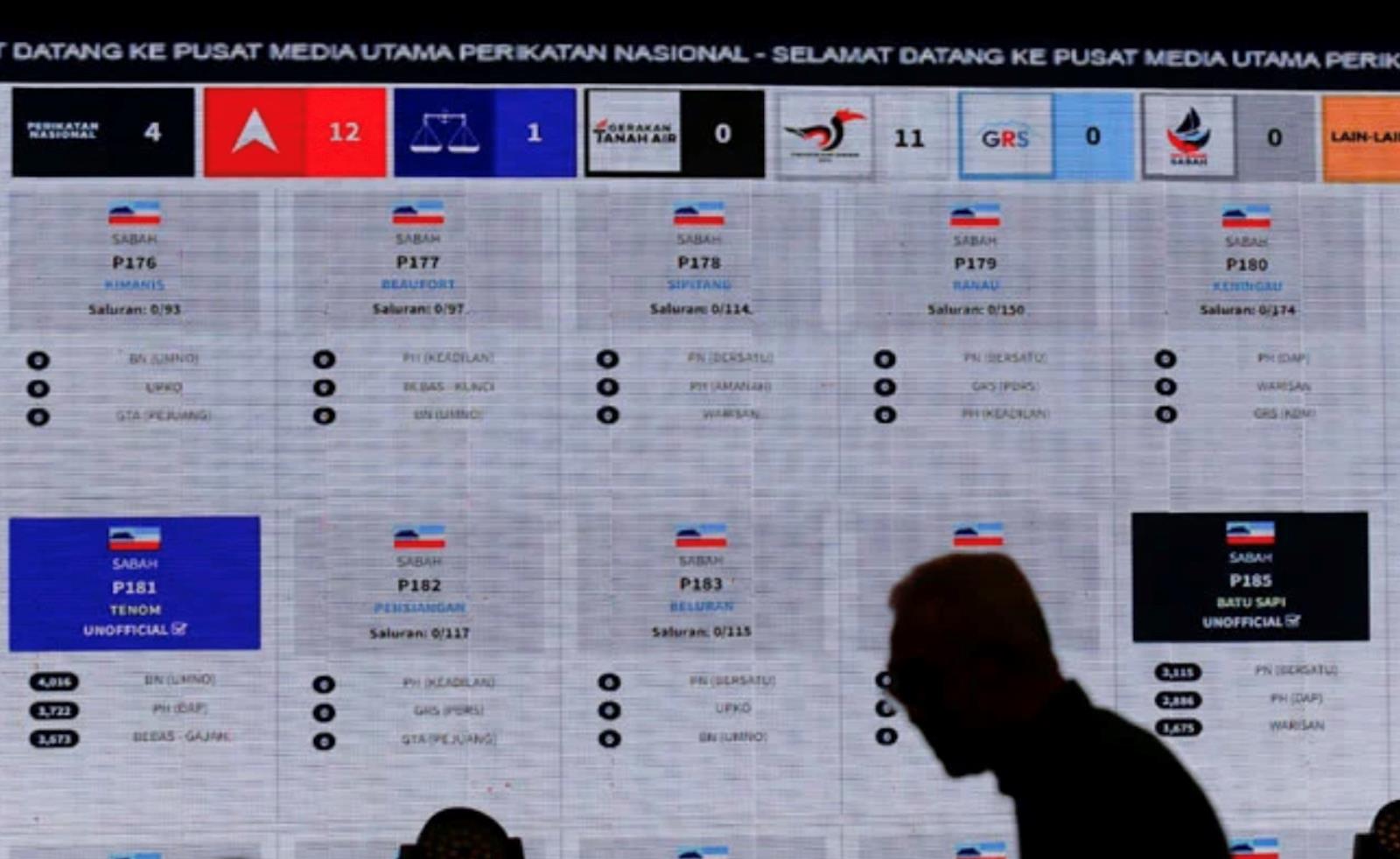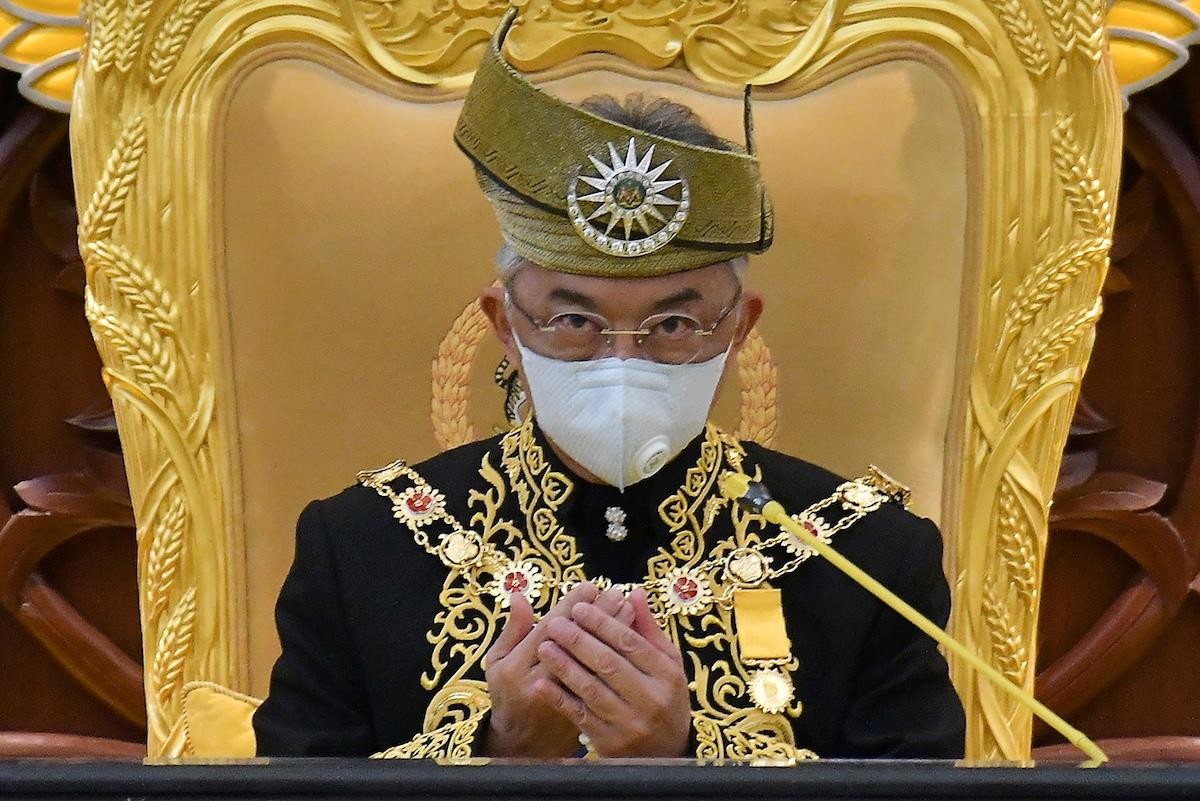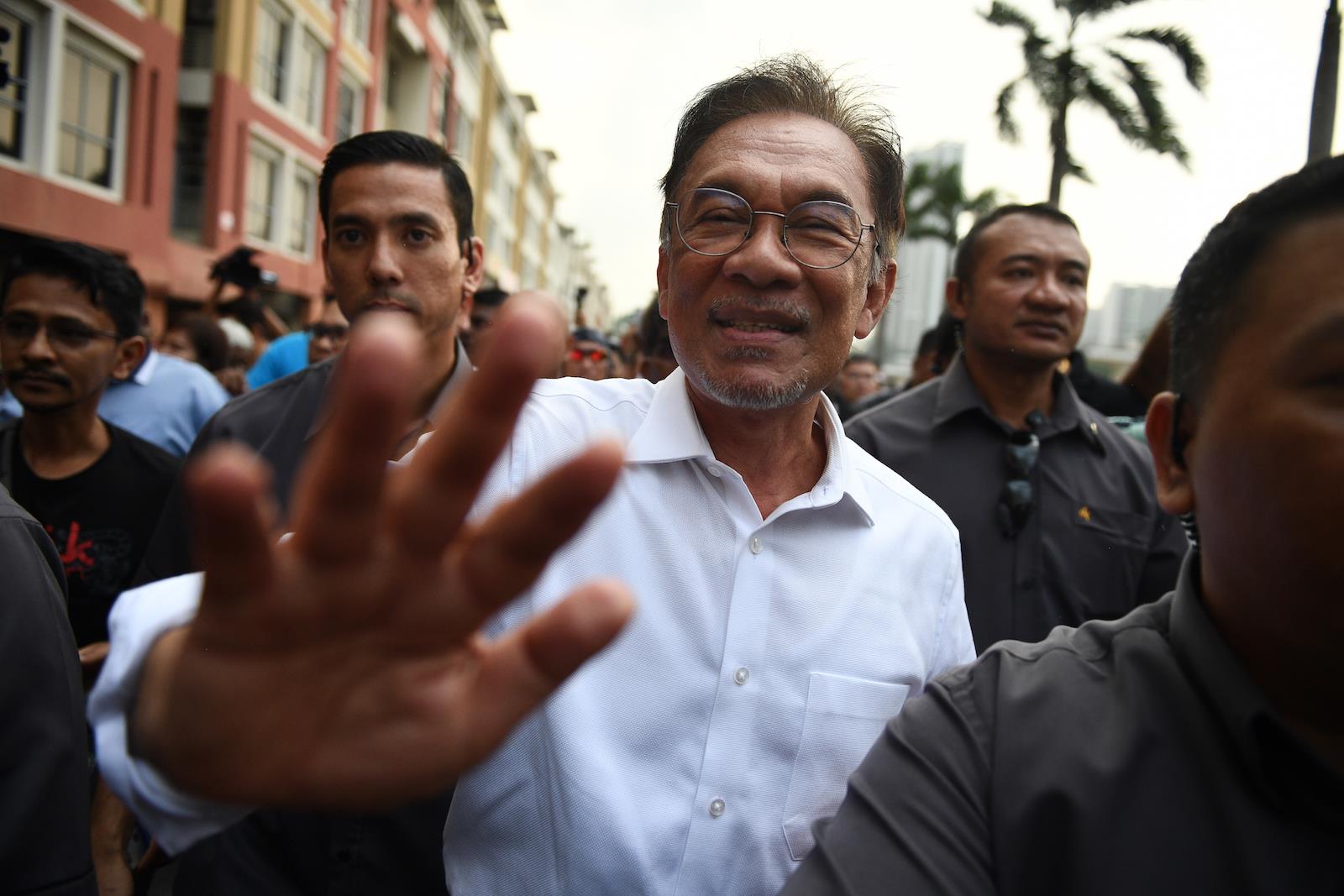(MENAFN- Asia Times) JOHOR BAHRU – Malaysia is in the grip of a Political impasse after a general election on November 19 produced a hung parliament with no clear winning party or coalition. More than four days since polling day, prime ministerial contenders Muhyiddin Yassin and Anwar Ibrahim have struggled to substantiate their conflicting claims of majority support.
Opposition leader Anwar's Pakatan Harapan (PH) won 81 seats at the polls, putting it ahead of Muhyiddin's conservative Perikatan Nasional (PN) bloc's 73 seats. The once-dominant Barisan Nasional (BN) delivered its worst-ever electoral performance, winning just 30 seats, but its lawmakers have now found themselves in the position of kingmakers.
What is clear is that an election called months ahead of schedule with the intent to stabilize the political landscape has done the opposite, putting the stability of the next government in question. The ringgit currency notably fell against the dollar and the Kuala Lumpur stock market weakened with the prospect of yet another wobbly government.
Coalition and party leaders have since Tuesday (November 22) come and gone from the Istana Negara, or national palace, for audiences with Malaysia's constitutional monarch. Sultan Abdullah Sultan Ahmad Shah reportedly sought to broker a unity government with PH and PN, a request Muhyiddin claims he rebuffed because his coalition has always explicitly ruled out such cooperation.
Muhyiddin, who previously governed as premier from March 2020 to August 2021, also insisted that he had the support of 115 elected representatives along with statutory declarations of their support. But the palace appeared unconvinced judging by a November 23 statement affirming that neither prime ministerial candidate had secured majority support.
With all major coalitions having failed to secure a simple majority of 112 out of 222 parliamentary seats, political leaders have scrambled to cobble together a post-election coalition to shore up their numbers. The king, or Yang di-Pertuan Agong, may then appoint as prime minister a lawmaker who in his judgment is likely to command a majority in parliament.
In addition to PH's 82 seats, three lawmakers from Parti Warisan and one from Parti Bangsa Malaysia (PBM) appear to be leaning toward Anwar's bloc. Six representatives from Gabungan Rakyat Sabah (GRS), two from Parti Kesejahteraan Demokratik Masyarakat (KDM) and one independent have likewise boosted PN's 73 seat count.
Muhyiddin appeared to have the momentum on his side a day after polls when Gabungan Parti Sarawak (GPS), a Borneo-based coalition with 23 seats, declared its support for a PN government. The bloc has since appeared to waver, saying it would support the candidate chosen by the king, though recent reports indicate they are still behind Muhyiddin's PN.

A man walks past a screen showing live results of Malaysia's 15th general election, at a hotel in Shah Alam, Malaysia November 19, 2022. Image: Screengrab / Geo TV
With pledged support from GPS and others, PN would have 105 seats behind its bid versus 86 seats supporting Anwar's PH. Complicating matters is the fact that BN has chosen to take a neutral stance, refraining from backing either PN or PH, the latter of which it held backroom negotiations with on November 21 amid speculation that a unity government was in the offing.
But dissent within the United Malays National Organization's (UMNO) ranks against partnering with Anwar's multiracial coalition, seen to be driven by corruption-accused party president Ahmad Zahid Hamidi, has reportedly been a stumbling block amid misgivings over allying with the ethnic Chinese-led Democratic Action Party (DAP), PH's largest component.
At UMNO's general assembly in May, the party issued a“No Anwar, No DAP” declaration to quell earlier rumors of Zahid and Anwar, who share long-standing ties dating back to the latter's stint as deputy premier in the 1990s, being in cahoots. Extraordinary scenes of PH and BN leaders meeting earlier this week had incensed UMNO division chiefs, who demanded Zahid's resignation.
Among the pro-opposition commentariat, a PH-BN alliance was cast as the realpolitik compromise needed to keep Muhyiddin's Parti Pribumi Bersatu Malaysia (Bersatu) and its Islamist ally Parti Islam Se-Malaysia (PAS) out of power, with the former seen as responsible for causing the previous PH's government's collapse and the latter deemed intolerant for its pro-sharia law stance.
Addressing the media after his audience with the king on Tuesday, Anwar said he remained confident of securing a simple majority and said there was“no question” of a minority government being appointed.“The established government should represent all races and all regions. That means to be inclusive in all respects,” added the PH chief, appearing determined to lead a unity government.
But with BN and its 30 representatives now opting to withhold support from either of the two leading coalitions, neither can form a government. At least 10 BN lawmakers had reportedly signed affidavits in support of Muhyiddin's premiership but withdrew them at the eleventh hour, which was purportedly why the palace decided that neither PN nor PH had a majority.
Following an audience with the king, Zahid told local media on November 23 that he and the two other top coalition leaders had received a decree to form a unity government, which he said would be deliberated by the supreme councils of his party and coalition. A royal directive could be pivotal in pushing Zahid to persuade his colleagues to support Anwar's bid.
“As we have seen in recent years, any coalition that relies on BN (in its reduced state) to form a majority will be inherently unstable given divisions within UMNO and with much depending on Zahid Hamidi's fate,”
Zahid is facing 47 criminal breach of trust charges over acts committed when he was deputy premier under Najib Razak, who is now serving a 12-year jail term for his involvement in the 1Malaysia Development Berhad (1MDB) financial scandal. Analysts suspect Zahid aims to leverage BN's kingmaker status to pressure the winning coalition into dropping charges against him.
With the configuration of the next government once again in royal hands, a special meeting of the Conference of Rulers (CoR), a powerful body that includes the king and eight other hereditary sultans, is due on November 24. The Star newspaper reported that“His Majesty will be seeking the opinions of the Rulers on the impasse in the formation of a federal government.”

Malaysia's King Sultan Abdullah Sultan Ahmad Shah can make the call on who leads the next government. Photo: AFP / Nazri Rapaai
Shad Saleem Faruqi, a Malaysian legal scholar and professor of law at the University of Malaya, said that if attempts to forge a governing coalition fail,“then the Yang di-Pertuan Agong may install a minority government, which may rely on an ad hoc support from MPs or groups to survive no-confidence motions, pass budgets and secure essential legislation.”
Short of joining a post-election pact with either PN or PH, BN could enter a confidence and supply agreement (CSA) with any minority government, which would be similar in practice to the Memorandum of Understanding (MoU) signed by PH and the Ismail Sabri Yaakob government in September 2021 in which the former agreed not to obstruct the government on critical votes.
“An untested possibility is that if no party or coalition can put together a majority, the king may exercise his influence to bring together a unity government of all parties. Now, unfortunately, this initiative by the king will drag the king in politics in a way that the constitution does not really contemplate,” Shad told Asia Times.
He added that if no party or coalition has a majority, then the bloc with the largest number of seats should get the first chance to form the government in accordance with British convention and the Westminster system of government. But the issue of when an individual lawmaker ceases to be a member of their own party“is now the heart of the matter.”
The longtime law professor added that if a minority government comes to power with the support of individual lawmakers in defiance of their party's stance,“these individuals may be victimized by their party [as] many parties have clauses within which say that if you defy the leadership, then you have ceased to be a member. Then the political uncertainty and all would be perpetuated.”
Such a scenario could potentially trigger by-elections under a bill passed in July to curb lawmaker defections, or“party hopping”, which introduced several constitutional amendments such as the triggering of a recall election when a lawmaker quits, switches parties or ceases to be a member of the political party whose ticket they were elected on.
PN and BN leaders were set to hold their first post-election meetings on Wednesday afternoon. The two coalitions had ruled in an uneasy cohabitation since March 2020, with UMNO playing second fiddle to Muhyiddin's Bersatu during the latter's 17-month administration prior to it being toppled when Zahid's faction withdrew support for his government.
Muhyiddin's coalition then became a junior partner to BN in a government led by Ismail, who became the country's third premier in three years. With UMNO, which governed the country from 1957 until 2018, now diminished as the country's fourth-largest party, it could still more plausibly align with other pro-ethnic Malay parties rather than the comparatively liberal PH.
However, the recent formation of a PH-BN state government could be a sign of things to come. PH agreed to form the state government in Perak under the leadership of a BN caretaker after polls yielded a hung state assembly, despite the latter only having nine state seats while it had 24. PH has attempted a similar government in Pahang, though it has yet to be formed.
Bridget Welsh, an honorary research associate at the University of Nottingham Malaysia's Asia Research Institute, said a PN-led government“will move national politics to the right. More importantly, if they end up being an opposition, they will be a destabilizing force appealing to racialized and religious hate speech, which we saw already in the campaign.”
Muhyiddin's coalition leveraged divisive rhetoric on the hustings, accusing Anwar's coalition of being stooges of a Jewish and Christian agenda. Amid the political deadlock, provocative social media posts warning of a repeat of Malaysia's deadly race riots on May 13, 1969, targeted at Malay Muslim viewers have proliferated, leading police to issue anti-incitement warnings.

Politician Anwar Ibrahim waves as he leaves after a press conference at the People's Justice Party headquarters in Petaling Jaya, on the outskirts of Kuala Lumpur, on February 26, 2020. Photo: AFP / Mohd Rasfan
Analysts had broadly failed to anticipate the significant election gains achieved by PN-component PAS, which secured the largest number of parliamentary seats, 44, of any single party – or 49 if Bersatu members who campaigned in the northern states of Kelantan and Terengganu under the PAS banner are counted. PAS won between 18 and 23 seats in the last three general elections.
The ultra-conservative party, which has advocated for a strict interpretation of Islamic criminal law, may arguably be the biggest beneficiary of a law reducing the voting age from 21 to 18, enacted in 2019 under the PH government, amid indications that it outperformed among youth voters. Its electoral success, coupled by continuing political turmoil, has given pause to foreign investors.
“The showing from PAS has already affected certain segments, including tobacco, alcohol and gambling-related interests,” said Richard Gardner, chief executive officer of fintech firm Modulus Global.“Generally speaking, there should be little question that a PN-led coalition would be less appealing to most foreign investment than a government led by Anwar Ibrahim.”
Follow Nile Bowie on Twitter at @NileBowie